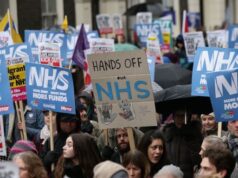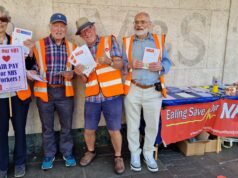GP Fury Makes NHSE Backtrack on Primary Care Network (PCN)-Driven Increased GP Workloads
In January 2020 ‘Health Service Journal’ reported that NHS England has reacted to loud GP protests across the country by withdrawing some of the planned extra duties for GPs in new PCN contracts. ‘Anticipatory Care’ and ‘Personal Care’ detailed in the 2020/21 PCN specification have been dropped. Care Home weekly visiting requirements are also likely to be changed.
Objections and agitation about the proposed changes and the risible engagement/consultation process include:
+ 1,000 doctors signed a petition calling the PCN plans ‘impossible’
+ On 27 January 2020 the Healthwatch and Public Involvement Association (HAPIA) sent a withering rebuke of the PCN changes engagement/consultation to NHS boss Simon Stevens. See: www.hapia2013.org
+ Apparently there was a consultation about the new draft service specification for the implementation of PCNs which ran for just 14.5 days from 23 December 2019 to 15 January 2020. Well established national NHS campaigning bodies like KONP and local ones including ESON, HAFSON and BPV knew nothing about this ludicrously short and ill-timed consultation.
Is Ealing’s Health and Wellbeing Board (H&WB) an Expensive Dinosaur?
On 28 January 2020 I spent 90 minutes in silent observation of a meeting of Ealing Council’s H&WB. H&WBs are statutory bodies introduced under the Health and Social Care Act 2012 (H&SC Act). The aim is to improve integration between local healthcare, social care, and related public services.
The Boards are also responsible for leading locally on reducing health inequalities. The local directors of adult social services, children’s social services and public health must attend the Board meetings, as well as an elected Councillor, CCG, NHS Commissioning Board and Healthwatch representatives.
This particular meeting was not well attended and of the 18 members of the Board just eight of them turned up. Many of them though were senior executives, whose combined salaries exceeded £500,000/year. By far the most interesting presentation was ‘HIV in Ealing’. It was great to hear that Paediatric HIV has virtually been eliminated. There are 1,000 HIV patients in Ealing. The demographic group most likely to be late presenters with HIV symptoms is the south Asian.
What was very noticeable in the meeting was the lack of any significant content on social care or healthcare and social care integration. In fact in the last six H&WB meetings during 2018 and 2019 the only social care issues discussed were older people’s social isolation, adult care funding and adult and children’s safeguarding. Integrated Care updates were all about how much of the Better Care Fund had been spent and how much was left to spend.
151 pages of Healthwatch Ealing (HE) reports presented at the meeting is not a helpful way of communicating information. HE is fatally compromised as it is funded not only by Ealing Council but also by Ealing CCG. By statute Healthwatch must hold its CCG to account, and if the latter is paying the former the conflict is blindingly obvious.
The H&SC legislation requires Local Authorities to create (and no doubt maintain) Joint Strategic Needs Assessments (JSNAs). Ealing has 23 of them. However only two of them are up to date (2019). They are Cancer and Drugs & Alcohol. Eight of them are five years old. Mental Health – with by far the largest group of sufferers (some 53,000 adults) – is two years old.
However the longest running scandal/idiocy about the Ealing H&WB meetings has been their inability/lack of desire to discuss the at times perilous state of Ealing Hospital based in an area of high health inequality – Southall. This dysfunction stretches way back to the first H&WB meeting on 23 May 2013 through all 38 meetings right up to the 28 January 2020 meeting. The common factor in all these 38 meetings agendas is the H&WB Chair – Councillor Julian Bell.
Unfavourable Outsourcing Arrangements for 1,000 Imperial Support Staff Smashed by UVW Union-Backed Agitation
Stunning efforts by the United Voice of the World (UVW) Union-led striking staff have released 1,000 cleaners, porters and caterers at hospitals in west London from unfavourable outsourcer contracts and into permanent NHS employment.
Some 200 UVW members at St Mary’s Hospital spearheaded a nine day strike, mass pickets, blockades, occupation and the storming of an Imperial College Healthcare NHS Trust Board meeting. The staff, as from 1 April 2020, will receive NHS basic pay rates, sick leave and pension entitlements. The new deal will apply to workers at Charing Cross, Hammersmith, Queen Charlotte’s and Chelsea, St Mary’s and Western Eye Hospitals. The workers, who are largely migrants from Europe, Africa, Latin America and Asia, will leave French outsourcer Sodexo.
UVW, formed in 2014, is a member-led campaigning trade union which supports and empowers the most vulnerable groups of precarious, low paid and predominantly migrant workers in the UK. It has extensively researched and documented the correlation between outsourcing, Hospital Acquired Infections (HAIs), cleanliness and patient care. More at:
Jeremy Hunt MP Elected Chair of House of Commons Health and Social Care Select Committee
Mr Hunt was, from 2012 to 2018, an extremely unpopular and unsuccessful Secretary of State for Health (and then also Social Care). This is totally unacceptable and is a clear conflict of interest. The phrase ‘marking his own homework‘ has been heard in Parliamentary circles.
The many health and social care failures under his six year leadership include:
+ His promise of 6,000 new GPs never even remotely materialised
+ His 95% of A&E patients seen in 4 hours target was consistently not met and often widely missed
+ The NHS England hospital maintenance backlog grew under his leadership – and now has reached £6.5 billion
+ care.data, an NHS information patient data sharing scheme, was launched in 2013 and abandoned in 2016 at a cost of £50 million
+ His 2016 new Junior Doctors contract resulted in the first doctors’ strike for 40 years
+ His devotion to the always failing 2012 NHS North West London ‘Shaping a Healthier Future’ plan. It cost over £250 million and was axed just six months after he departed the health and social care stage.
Almost 50% of Senior NHS Leaders Planning to Leave Because of Pension Changes Driven Additional Tax Bills
A recent survey by NHS Providers of executives of NHS ambulance, community and mental health services strongly suggests that the 2016 pension rules changes will cause an exodus of senior managers in 2020/21. The 2016 pension rule changes saw the annual tax free pension savings allowance reduced from £40,000 to as little as £10,000 for incomes of more than £110,000/year. Those earning over £110,000/year could end up paying tax rates of more than 90%. For those nearing this financial threshold, their options include reducing their paid hours of work, quitting the NHS pension scheme or taking early retirement.
It’s a Long Time Waiting for the NHS NWL Long Term Plan (LTP)
The national LTP was published in January 2019. Its appearance and content ‘trumped’ the NHS NWL October 2016 Sustainability and Transformation Plan (STP). Two months later the DHSC abandoned the NHS NWL ‘Shaping a Healthier Future ‘ (SAHF) plan. So here we are in north west London 13 months later with no regional care ’transformation’ plan. Ms Juliet Brown of NHS NWL announced in public in January 2020 that the latest (final?) version of the NHS NWL LTP would be published in April 2020. I’m afraid this person’s credibility is constrained by the fact that every time we see her in public she seems to have adopted a new job title! Since 2016 we’ve seen her as Strategy and Transformation, Director of Operations SaHF, STP Programme Team, Director of the NWL STP, Local Services Transformation Director, Workforce Lead Strategy and Transformation, and now Health and Care Partnership Director.
It’s timely to remind ourselves of what is contained (and not contained) within the national LTP and the draft regional LTP:
+ 60 promises completely uncosted
+ Undemocratic and dangerous legal changes. These include the merging of local CCGs into mega regional CCGs – to cut spending. Even without an approved regional LTP, NHS NWL is targeting April 2021 for the NHS NWL CCG, and ‘partnering’ between local NWL CCGs has started – again for cost cutting reasons. Ealing and Hounslow CCGs are ‘working together’ and some functions will be shared and no doubt ‘duplicate’ staff let go.
+ Nationally the plan is to reduce our 7,500 GP practices into 1,500 super practices. (The eight NHS NWL Primary Care Networks (PCNs) linking 396 GP practices look like they could – painfully perhaps – morph into eight super practices). Nationally this approach might reduce the number of GP practices to under 500. Maybe this will be in the (2022?) NHS plan which replaces the LTP – as transformation planning cycles within the NHS are becoming shorter and shorter….
+ Integrated Care Systems (ICSs) post 2021 will all morph into Integrated Care Partnerships (ICPs). No doubt private companies will compete for these 44 ICP contracts nationally, which as non-statutory bodies will not be formally accountable to public scrutiny.
+ No explicit national/regional LTP programme exists for Ealing Hospital. The NHS NWL SaHF plan (2012 – 2019) mandated the hospital’s downgrade from ‘Major Hospital’ to ‘Local Hospital’ including eliminating its A&E unit – but failed to implement this. The NHS NWL STP plan (2016 – 2019) unhelpfully refers to the ‘the ongoing uncertainty of the future of Ealing Hospital’.
+ The draft NWL LTP proposes to free up a further 100 beds by April 2020. With just seven weeks to go one wonders if this bed reduction has happened or will happen. NHS boss Simon Stevens, the Kings Fund and the BMA have all requested more beds, not fewer. Add to this the worst A&E performance (in December 2019) since records began and reducing beds seems like organisational self-harm.
+ So many references to ‘Hubs’ in the NWL LTP draft – ‘a network of Primary Care Hubs and Community Training Hubs’, ‘Digital Healthy Hubs’ and ‘a Pan NWL London Hub’. Are they contained in existing buildings? If they are to be new buildings just what hope is there for capital grants to build them? Minutes of devolved London care meeting chaired by the London Mayor make it clear that only Imperial and Hillingdon Trusts in NHS NWL will be recipients of any Government money for building work.
+ 100s of £millions have been wasted in NHS NWL in recent years. Very large deficits/debts exist in both the commissioning and service delivery sectors. Common sense dictates there can be no significant financial recovery (i.e. cost cutting) without significant reductions in the quantity and quality of care probably over the next five years. There is a lack of honesty and transparency in the NHS NWL LTP draft to reflect this.
+ Major Improvement in mental health and mental social care provision services is not a feature of the national LTP nor the NWL LTP. Affecting one in five adults – with over 11 million adult sufferers nationally and over 370.000 sufferers in NWL – mental health and mental social care are the major care challenges. Both LTPs fail miserably to address these challenges.
Self-Harming in Gaols Reaches Record Levels
During the period October 2018 to September 2019 61,401 prisoners in gaols in England and Wales self-harmed. This number was the highest figure ever recorded and was 16% higher than in the previous year. One can only conclude that the number of people incarcerated with mental health problems is increasing and/or that the condition of those suffering has deteriorated.
Also the number of attacks on prison staff in the year to September 2019 was 10,059 – which is a staggering increase from 2,937 attacks in 2010.
Rapid Response Teams – ‘Robbing Peter to Pay Paul’?
The failing mantra of ‘treat fewer patients in hospital and more in the community/at home’ was trotted out again at the January 2020 launch of Urgent Community Response Teams. These teams aim to treat older people in their homes. Sounds great on paper but in practice will there be the staff to populate these teams?
The teams will ostensibly be made up of Physiotherapists, Occupational Therapists and nurses. However there are no ‘spare’ nurses or therapists. The current vacancy rate for nurses in England is 43,000 (RCN). So, in order to assemble a mobile team of staff, these staff will have to leave their static treatment bases (hospitals?) and their patients.
To compound the response team challenge, they will be jointly run by Local Authorities (LAs) and NHS bodies. This joint working (or ‘co-production’ to give it its modern label) is going to be the business process of choice in the 44 Integrated Care Systems (ICSs) of 2020/21. The subsequent Integrated Care Partnerships (ICPS) which will grow out of the ICSs will also be LA/NHS dominated bodies.
The track record of LA/NHS ‘integration’ locally is not brilliant. LAs and the NHS working together locally possibly hit its nadir in 2016 when both Ealing and Hammersmith & Fulham Councils refused to be railroaded into signing up to the NHS NWL Sustainability and Transformation Plan (STP). In January 2020 senior staff at the West London NHS Trust Board meeting voiced their frustration in dealing with Ealing Council social care policies and processes.
‘GP At Hand’ Disrupting Analogue-First General Practice
Babylon Technologies’ ‘GP at Hand’ really is running the NHS ragged all over the place. And the Health and Social Care Minister Matt Hancock MP raving about how good the product is and how he’s a user gives a whole new meaning to the phrase ‘inappropriate behaviour’.
GP at Hand replaces seeing your GP in person with having a consultation with a GP on your SmartPhone. The service is underpinned by an Artificial Intelligence-based symptom checker. The service is not available to patients who are pregnant, frail and elderly or have a terminal illness. Apparently patients are also shunned if they have mental health problems, drug problems, dementia, a learning disability or safeguarding needs. A cynic might describe GP at Hand as Primary Care for the healthy.
Allegedly 18 CCG territories have patients who have switched from ’analogue-first’ GP practices to GP at Hand ‘digital-first’ GP practices. New NHS England guidelines are that when/should the number of GP at Hand patients in any CCG territory reach 1,000 in total instead of Hammersmith & Fulham CCG picking up the bill, these patients will be ‘repatriated’ to the CCG where they live.
Latest GP at Hand scores are 72,640 patients in London and 1,718 in Birmingham. NHSE has declined to sanction the services’ expansion into Manchester and says it wants expansion to be primarily in areas currently ‘under-GP’d’.
Eric Leach




